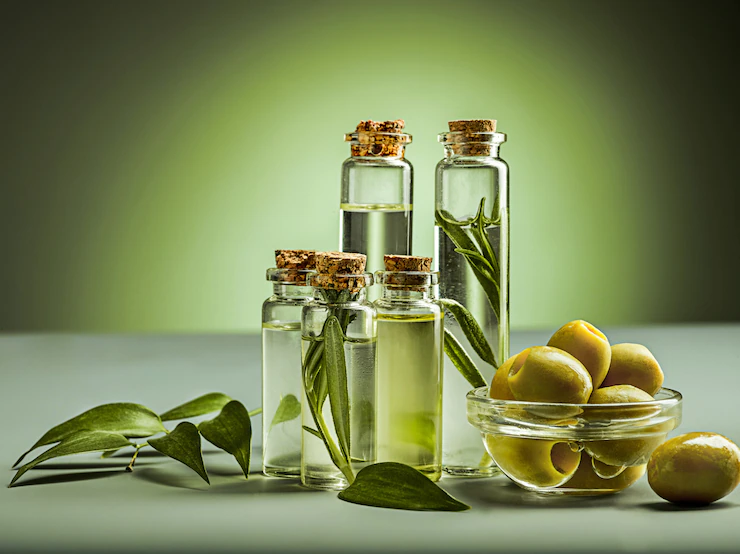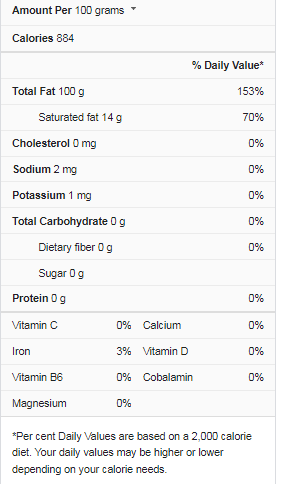Olive oil is a versatile ingredient, perfect for high-heat and low-heat Cooking. When cooking with extra-virgin olive oil, keep in mind that it is more pronounced when used cold than in hot temperatures. Therefore, extra-virgin olive oil is best for pan-frying and roasting. It is also a better choice for deep-frying as it has a higher smoke point. And don’t worry if you don’t know what type of olive oil to use.
You can use virgin olive oil for Cooking. The cold-pressing extraction method produces the oil in an unrefined form with a higher aroma and flavor than other kinds. Virgin olive oil is slightly higher in acidity but is still suitable for Cooking. The acidity level is low, and its flavor is milder than the extra virgin type. Besides using it for cooking, it can be consumed as salad dressing, beneficial for your health.
Olive Oil Nutrition Fact
What Is Olive Oil?
Olive oil is made from the fruit of the olive tree, olives. The Mediterranean region’s traditional crop is olives, and olive oil is made by pressing entire olives. Olive oil is used in various ways, including Cooking, cosmetics, medicine, soaps, and as a fuel source for traditional lamps. Olive oil originated in the Mediterranean, but it is now consumed worldwide.
Olives are preserved in olive oil or salted water in the diet. They eat them whole or chopped, and they use them to make pizzas and other foods. Olive oil can be used as a bread dip, a pouring on pasta, Cooking, or salad dressing. For therapeutic purposes, some people eat it by the tablespoon.
Nutritional Value Of Olive Oil
Check out the below details to get an idea of the nutrition olive oil contains:
Fats
One hundred grams of total fat and 14 grams of saturated fat make up one tablespoon of olive oil. Even though most fat is healthy2, it’s still a good idea to keep your intake under control because it’s calorie-dense.
Minerals & Vitamins
One tablespoon of olive oil contains about 1.9 milligrams of vitamin E. Vitamin E keeps our cells healthy by protecting them from free radicals, boosting immunity, and preventing blood from clotting in blood vessels.
Olive oil has 8.1 micrograms of vitamin K in the same amount. Blood clotting, bone metabolism, and bone mineralization are just a few of the activities that this vitamin plays.
Olive oil has a trace amount of potassium, about 0.1 milligrams per tablespoon. Potassium helps the kidneys and heart operate properly and assists muscle contraction.
Calories
One hundred grams of Olive oil has 884 calories per tablespoon, making it a calorie-dense food. When you cut the amount to one teaspoon, the calorie count drops by about two-thirds or around 40 calories per serving.
Olive Oil
This rich-tasting olive oil, expertly created by The Olive Oil People, is genuinely crafted by Pompeian’s family of olive producers and craftsmen. Because our olive growers and olive oil craftsmen have painstakingly cultivated the world’s best olives from grove to table, making the best-tasting, highest-quality olive oil, you can taste the difference in Pompeian olive oils from start to end. Our olive oils are crafted with authenticity in mind to help you eat and live well every day. Grilling and sauces are made easier using Pompeian Rich Taste Olive Oil.
Health Benefits Of Olive Oil
Including olive oil in your diet looks to have some health advantages.
Immunity Booster
Vitamin E, a fat-soluble vitamin that aids in immunity and disease prevention, is abundant in olive oil.
7 Olive oil may also aid with the management of immune-inflammatory illnesses such as rheumatoid arthritis and inflammatory bowel disease, according to specific research.
Cardiovascular Health is Improved
Olive oil polyphenols may help protect the heart. This is due to the polyphenols’ ability to prevent blood platelets from clumping together, which is a leading cause of heart attacks. 9 Olive oil contains vitamin K, which aids in blood clotting.
The United States Food and Drug Administration recommends that you consume 1.5 tablespoons grams) of olive oil every day to help lower your risk of coronary heart disease.
Helps to Maintain a Healthy Cholesterol Level
Monounsaturated fats, such as those found in olive oil, have been demonstrated to raise “good cholesterol,” or HDL while lowering “bad cholesterol,” or LDL. High cholesterol levels can increase the risk of heart attack and stroke, even though the body needs specific cholesterol for cellular and hormonal function.
Helps to Reduce Inflammation
A high c-reactive protein (CRP) level indicates an inflamed body. According to some studies, consuming extra virgin olive oil (about one to two tablespoons per day) has anti-inflammatory effects by lowering CRP. 9
Some anti-inflammatory chemicals in olive oil, such as oleocanthal, are abundant in virgin and extra-virgin olive oil.
Protects the function of the brain
Research suggests that ingesting olive oil could give protection from cognitive impairment. This is especially crucial as we become older, as our cognitive capacity tends to deteriorate.
How Is Olive Oil Produced?
Olive oil is derived from the fruit of olive trees, which are most commonly found in the Mediterranean region. After harvesting, olives are crushed into a paste, decanted, and centrifuged to isolate the oil. After that, the finished product is stored in oxygen-free stainless steel tanks, and it should be packaged in a dark glass bottle to keep the oil fresh.
Extra-virgin olive oil (EVOO) is cold-pressed from mature olives mechanically without the use of excessive heat or chemicals, according to the International Olive Council’s guidelines. This is supposed to retain phenols, which is why olive oil is regarded to have such potent health effects. On the other hand, refined olive oil is made using heat or solvents to produce a flavorless oil that may be combined with other oils.
How To Choose Best Olive Oil For Cooking?
When choosing olive oil for Cooking, you should look for a high-quality product. Extra-virgin olive oil is considered the best and is known for its health benefits, including preventing colon cancer. But it also has lower fat content than other types. So, you’ll need to find one that suits your Cooking needs best. There are several types of extra-virgin olive oil.
The best type of olive oil for Cooking depends on your preferences. If you’re using it for raw applications, choose virgin oil. If you’re using it for cooking, look for extra-virgin olive oil. It will not taste bitter or burn when cooked correctly. You can also find it at any health food store. It’s best to try different brands. Once you’ve found the right one, make sure to buy it in the right amount.
Extra-virgin olive oil is the best choice for Cooking. It’s the lowest-quality type, and its acidity level is lower than the other two. It’s also the best for Cooking. It has excellent health benefits, so choosing the right type is essential. Once you’ve determined which kind is right for your needs, you’ll be happy using it for Cooking. You’ll find recipes for any occasion that calls for it in this deliciously fragrant liquid.
Culinary Use Of Olive Oil
- Olive oil is the most widely used edible oil in the Mediterranean, Asia Minor, and North African regions, and it is also the most expensive. However, its use is rapidly growing across continents, particularly among health-conscious people concerned about their weight.
- Olive oil is one of the most sought-after culinary oils. It is used in various applications, including salad dressings and gourmet oils, and deep-frying and sautéing vegetables, pork, and poultry.
- Andalusian salad is a regional dish from the Andalusia region of southern Spain. It is made with tomatoes, cucumber, onion, bell pepper, thyme herb, and extra-virgin olive oil, among other ingredients.
- A favorite Italian recipe is an eggplant fry made with olive oil, tomatoes, onions, capers, and seasonings such as black pepper and salt.
- Black olive tapenade is a traditional dip that originated in the South of France and is created with black olives, walnuts, onion, garlic, pepper, and lemon juice, among other ingredients. Depending on your preference, it can be used as a spread or a dip.
What Are The Side Effects Of Olive Oil?
Taking counsel from a doctor before drinking Olive Oil is highly suggested in the case of breastfeeding mothers. Because olive oil has been shown to lower blood glucose levels, it is also recommended that people who take olive oil supplements keep an eye on their sugar levels.
Although olive oil can help lower blood pressure, it is recommended that those who take olive oil supplements have their blood pressure checked often.
Olive oil is well-known for its heart-healthy properties. However, investigations have discovered that excessive use of olive oil might result in a significant drop in blood pressure. We become more susceptible to various health concerns, including dizziness, lightheadedness, stroke, and renal failure, due to this lifestyle decision.
Conclusion
You can use olive oil in many ways. It can be used in everyday cooking, and it can be rubbed over meat. It can be used as a salad dressing, and it can be used as a dip for bread. It can be expensive, so you should carefully consider what you’re buying. So, check out the pros and cons of each before making any purchases. But remember: “A good olive oil is a healthy one.”
Olive oil is packed with heart-healthy fats and antioxidants, making it an excellent addition to a well-balanced nutritional diet. It has also been linked to many health advantages, including preventing inflammation, heart disease, breast cancer, and type 2 diabetes, among others. According to the MyPlate standards of the United States Department of Agriculture, olive oil is a healthy fat, which means it includes no protein or carbohydrates and is a good source of fat (including fiber or sugar). With only a minor quantity of polyunsaturated and saturated fat, most of its fat comprises heart-healthy monounsaturated fatty acids (MUFAs).




